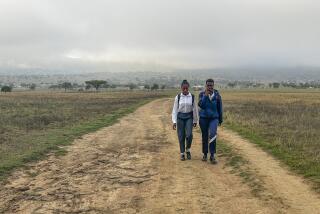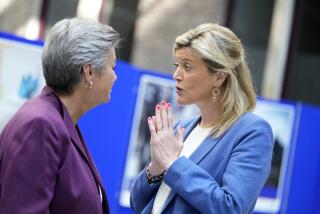S. Africa Police Rout Teachers, Pupils Trying to Reopen Schools
- Share via
JOHANNESBURG, South Africa — Police moved in with tear gas and rubber bullets Tuesday to put down efforts by thousands of mixed-race pupils and their teachers to open schools closed because of rioting near Cape Town.
Witnesses said at least 150 pupils, parents and teachers were arrested and several people were wounded, including a bus driver knocked unconscious by a stone and a youth hit in the chest and head by birdshot fired by police.
In other developments:
--Black students boycotted classes near Johannesburg and Pretoria.
--On the second day of its invasion of Angola, in what South Africa says is a search for black guerrillas, the South African military offered no news about the fighting. A spokesman blamed bad communications.
--The Prisons Department issued a brief statement saying that imprisoned black leader Nelson Mandela “is receiving the necessary medical treatment prescribed by a urologist. The situation is positively under control and his family is fully involved.”
No Decision on Surgery
Mandela’s wife, Winnie, said after visiting her husband in Pollsmoor Prison in Cape Town last Wednesday that a government-provided urologist suggested surgery. She said Mandela, 67, has a swollen prostate gland and cysts on his liver and right kidney, but he had not decided whether to have an operation.
Riot police engaged in running battles with pupils, parents and teachers gathered around schools in the Cape, where the government closed 464 mixed-race schools indefinitely on Sept. 6 after day-and-night rioting. About 360,000 pupils had been attending the schools.
Witnesses said scores of arrests were made as crowds massed outside locked schools. The mobs were dispersed before they could push their way in.
People outside the schools complained that closing them hurt students who had not rioted. The white-minority government contends that the schools provided meeting grounds for rioters.
Krugerrand Ban Speeded
Meanwhile in Washington, Secretary of State George P. Shultz told Congress on Tuesday that a ban on the importation of Krugerrands, a key element of the Reagan Administration’s program of economic sanctions against South Africa, should take effect within a matter of weeks.
Shultz told a Senate Judiciary subcommittee that the Administration is not awaiting permission under an international trade agreement to impose the ban, as congressional critics have charged, although he added that the Administration is completing a “notification and consultation” procedure under the General Agreement on Tariffs and Trade.
In his formal presidential order implementing sanctions, President Reagan directed his Administration to consult with America’s trading partners “with a view toward adopting a prohibition on the import of Krugerrands.”
But Shultz said the United States is in the process of notifying GATT trading partners “after which the importation of the Krugerrand will be banned.”
Asked when that would take place, Shultz said “not very long,” adding “weeks at most.”
More to Read
Sign up for Essential California
The most important California stories and recommendations in your inbox every morning.
You may occasionally receive promotional content from the Los Angeles Times.













